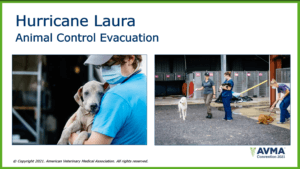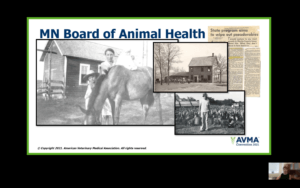On the first day of the 2021 American Veterinary Medical Association (AVMA) Virtual Convention, we partook in a few of the many amazing sessions that AVMA had to offer. One that stood out to us in particular was the Lessons Learned from Recent Response to Animals in Disasters 3-part series.
Experts on the topic included Peter Mundschenk, Chance Armstrong, LSU School of Veterinary Medicine, Julie Helm, Clemson University, Beth Thompson, Minnesota Board of Animal Health, Michael Martin of NCDA&CS, and Wesley Bisset, Texas A&M University.
Previously, AVMA has offered resources on planning for disasters, anticipating, and responding to these unexpected phenomena available on their site.

Animals are often caught in disasters, especially when it comes from fallen trees from storms and flooding in the area. In these horrific events, AVMA steps in to communicate and figure out the best way to get animals out of trouble in their times of need. AVMA PLIT (Professional Liability Insurance Trust) representatives often reach out to first responders and veterinary practices for guidance and information.
One of the main points in the session noted the importance of communication. With examples from past disasters, like Hurricane Laura, some of the preparations and challenges were discussed. On top of that, the work that was accomplished during this unfortunate event was discussed to give attendees an idea of what a typical event looks like. With infrastructure like power, water, and sewage devastated, response teams came within 12 hours and were able to get 90 animals moved within 48 hours.
On their site, AVMA provides steps for planning disasters. Some tips included:
- Coming up with a plan
- This creates a sense of calmness in the midst of a disaster
- Have your animal permanently identified with an ID or dog tag
- Research beforehand so that you know what to expect
Along with these tips on the site, AVMA provides outside links catered toward more specific needs such as pet owners with big dogs, Knowing how to prepare your pet, and even information specifically for horse owners.

Other speakers also spoke about the spread of animal diseases, especially with COVID going on. One of the most memorable things was how it all began. Decades ago in Minnesota, once diseases became a concern in animals, it was discovered that the Board of Animal Health was an essential factor in discovering not only animal diseases but general spreading diseases.
For more information on being prepared for animals in disasters, visit the AVMA site.
About the American Veterinary Medical Association
The American Veterinary Medical Association’s vision is to be the trusted leader in protecting, promoting and advancing a strong, unified veterinary profession that meets the needs of society. The mission of the Association is to lead the profession by advocating for our members, and advancing the science and practice of veterinary medicine to improve animal and human health.

